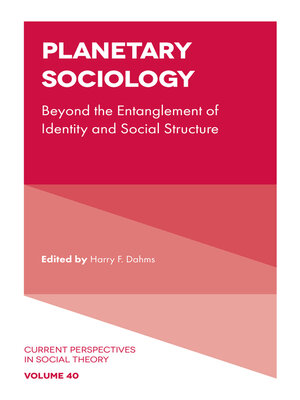Planetary Sociology
ebook ∣ Beyond the Entanglement of Identity and Social Structure · Current Perspectives in Social Theory
By Harry F. Dahms

Sign up to save your library
With an OverDrive account, you can save your favorite libraries for at-a-glance information about availability. Find out more about OverDrive accounts.
Find this title in Libby, the library reading app by OverDrive.



Search for a digital library with this title
Title found at these libraries:
| Library Name | Distance |
|---|---|
| Loading... |
In Planetary Sociology: Beyond the Entanglement of Identity and Social Structure, Harry F. Dahms gathers a team of interdisciplinary junior social scientists who examine their individual identity as being shaped by specific social contexts such as nationality, class, and race, to scrutinize how their interests as social scientists are responses to such contexts and culturally specific circumstances (Part II). Acknowledging the limits of economic, organizational, and technological modernization at the national level, planetary sociology delineates the type of critical social, political, cultural, and environmental reflexivity required for "progress," "health," and "development" to be meaningful categories.
Including contributions from senior scholars in the field who do not rely on the paradigm of planetary Sociology (Part III), this volume of Current Perspectives in Social Theory illustrates the importance of scrutinizing links between individual identity and social structure, without employing the paradigm of planetary sociology. Taken together, the chapters in this volume are essential reading for both undergraduate and graduate students eager to understand a rigorous social-research mindset, along with professionalization, methodology, and theoretical orientation, and related applications. Presenting an opportunity for social theorists and social scientists to learn about the challenges faced by younger sociologists, the examples of "applied theory" included here emphasize the importance of critical self-reflexivity in and for the 21st century, and the challenges it represents to social scientists, theorists, researchers, and teachers.







